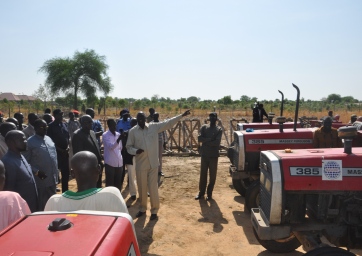Agricultural research center opens in Jonglei state
December 5, 2015 (BOR) – The government of South Sudan’s Jonglei state has opened an agricultural research center, constructed by the Korean horizontal military engineering contingent to support agriculture, education and extend service delivery.

During the inception of the Hanbit Agriculture Technology Research Center (HATRC) on Saturday, the state minister of agriculture, Mayen Ngor, described the center as small but ‘hanbit’, meaning a big light in the process of agricultural development in Jonglei.
“We all know our state remains food insecure, given the abundant fertile land, plenty of water, sunshine, the next vital link in the food chain is poor weak producer, farmer, and business persons that require change in mindset, attitude, and life style”, said Mayen.
“The main reason for hanbit agriculture technology research center is about teaching and training agricultural extension officers and farmers on how to grow 12 months a year using natural resources and available inputs”, he added.
HATRC occupies a 2.56 hectares of land planted with fruits, wood trees, vegetables and orchard with the interlinked irrigation system using the nearby deep pan, an official said.
According to the agriculture minister, the center will translate the science based research results for practical application, engage farmers, students and agricultural officers in transferring knowledge by providing reliable information, improved agricultural practices to help the public generate enough income to support their respective families.
The commander of the Korean horizontal engineering contingent, Colonel Kim Byung Chun said the establishment of the newly unveiled research center was a stepping stone in agricultural development in Jonglei state.
The initiative, he stressed, was supported by the Government of the Republic of Korea.
“Hanbit center is a stepping stone for agricultural and even economic development in South Sudan”, said Kim.
Kim said the center would produce seeds of hope for the people in South Sudan.
The state deputy governor, who represented his boss at the function, said the center still needed to be developed further, with Korean support until it is able to stand on its own.
(ST)
